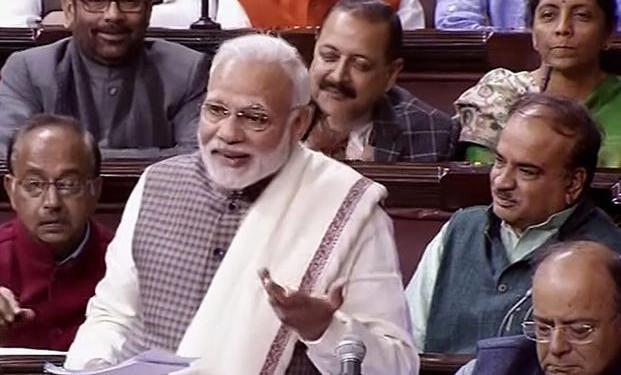After getting an unprecedented mandate in the Lok Sabha elections this time around, the BJP holds comfortable majority in the lower house of the parliament with 303 seats. However, the NDA’s number in Rajya Sabha remains at a 113. With the majority mark set at 123 seats, and the opposition led by Congress firmly decided on opposing BJP’s every move, getting the bill passed in the parliament was envisaged to be a difficult move. However, as recent happenings indicate, BJP has been able to pass all their bills in the Rajya Sabha comfortably, by virtue of the able-minded opposition leaders.
On Thursday, an amendment to the Right to Information Act, 2005 (RTI) was passed in the parliament. Apart from the NDA, the bill was supported by Naveen Patnaik led BJD, KCR led TRC and Y.S. Jaganmohan Reddy led YSRCP. The Opposition’s proposal to send the RTI Amendment Bill to select committee was defeated with 117-75 in the Rajya Sabha.
The amendment doesn’t make any changes in the prescribed duties or powers of the statutory heads or its bodies but gives the government the power to determine the salary and other service terms of the heads.
However, this move was being widely criticized by Congress. Sonia Gandhi seemed to have personal qualms against the amendment and a day after the bill was passed in the Lok Sabha, she had alleged that the BJP is “hell-bent on completely subverting” the RTI Act. She stated, “It is a matter of utmost concern that the central government is hell-bent on completely subverting the historic Right to Information Act, 2005. This law, prepared after widespread consultations and unanimously passed by Parliament, now stands at the brink of extinction.”
Congress has a history of calling the shots in the Upper House, and such vehement opposition would have definitely led to some chaos, however, surprisingly enough, the procedure was quite smooth. Home Minister Amit Shah is to be lauded for this. According to reports, Amit Shah had reached out to KCR, the morning of the day the bill was to be introduced and spoke to him, which led to him voting in favour of the bill.
YSRCP was already in favour of the bill. YSRCP MP Vijayasai Reddy had stated, “We will support the RTI (Amendment) Bill… It is not correct to demand that all bills be sent to the Standing Committee or Select Committee.”
Similarly, BJD had also unwaveringly supported the BJP. PM Modi’s and Patnaik’s amicable relations with one another have been visible to all, since before the elections. Last month, BJD had even supported the candidature of Ashwini Vaishnav, a BJP candidate on one of its own Rajya Sabha seats. Prior to this, Vaishnav had been a BJD member.
Sonia Gandhi’s efforts to unite the opposition have miserably failed. Such is the irrelevance of the grand old party that their view makes no difference to the ruling party or to the opposition.
Prior to this, on Wednesday, the Rajya Sabha had passed the amendments to the Protection of Children from Sexual Offences Act 2012 (POCSO). The bill was introduced in the Rajya Sabha by Women and Child Development Minister Smriti Irani. The amendment sought to increase the punishments for crimes against the minors.
This bill was supported by the entire opposition, who had harmoniously united to fight against the unnatural perpetrators of crimes against minors.
Earlier this month, Amit Shah’s first legislative agenda as the Union Home Minister was successfully achieved as two bills on Kashmir had been passed in the Rajya Sabha. The upper house of the Parliament passed the bill approving President’s Rule in Jammu and Kashmir for a period of six months. The Rajya Sabha also passed the Jammu and Kashmir Reservation (Amendment) Bill, 2019.
Contrary to expectations, the two bills on Kashmir were approved by the principal opposition parties including, Congress, Trinamool Congress, and the Samajwadi Party. Other parties which supported the bill included Rashtriya Janta Dal (RJD), Janta Dal-United (JDU), and Biju Janta Dal (BJD). Those who opposed the Bill included Left, PDP, and DMK.
Thus, as is clear, the earlier notions of NDA going through difficulties to pass bills in Rajya Sabha have been successfully negated. The first 50 days of the Modi government have been extremely successful, with bills smoothly sailing through the Rajya Sabha. As anticipated earlier, NDA does not have to wait for a complete majority in the upper house to get its legislation through. The divided opposition and NDA’s consensus-building approach have already made it possible.



























